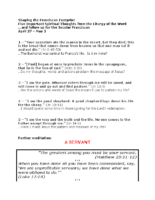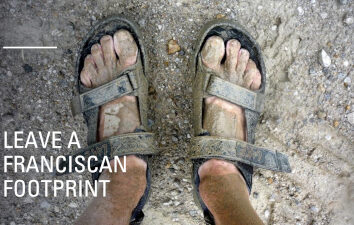Shaping the Franciscan Footprint
Five Important Spiritual Thoughts from the Liturgy of the Word
…and follow up for the Secular Franciscan
April 27 – May 3
1 – “Your ancestors ate the manna in the desert, but they died; this is the bread that comes down from heaven so that one may eat it and not die.” (Jn 6:49-50)
…The Eucharist was central to Francis’s life. Is it in mine?
2 – “[Paul] began at once to proclaim Jesus in the synagogues,
that he is the Son of God.” (Acts 9:20)
…Do my thoughts, words and actions proclaim the message of Jesus?
3 – “I am the gate. Whoever enters through me will be saved, and will come in and go out and find pasture.” (Jn 10:9)
…Are the actions and words of Jesus the means I use to pattern my life?
4 — “I am the good shepherd. A good shepherd lays down his life for the sheep.” (Jn 10:11)
…I should spend some time in thanksgiving for the Lord’s redemption.
5 – “I am the way and the truth and the life. No one comes to the Father except through me.” (Jn 14:6)
…Have I made Jesus the pattern and measure of my life?
Further meditation:
A SERVANT
“The greatest among you must be your servant.
(Matthew 23:11-12)
+++
When you have done all you have been commanded, say,
‘We are unprofitable servants; we have done what we were obliged to do.’”
(Luke 17:10)
+++
“Do you realize what I have done for you?
If I, therefore, the master and teacher,
have washed your feet,
you ought to wash one another’s feet.
I have given you a model to follow,
so that as I have done for you, you should also do.”
(John 13:12-15)
It is always interesting to study the way some people look at religion. Two of the Apostles had a pretty specific idea of what it meant for them. For them, it led to power:
Grant that in your glory we may sit one at your right and the other at your left.
That remark made the other Apostles angry because they wanted the same thing, and they felt that they were not getting it.
We are often inclined to think of religion the same way the Apostles looked at the kingdom. Why do we go to Church? Why worship God? To feel good, have happiness, eternal life, good graces from God, obtaining what we pray for? That is, to obtain some type of reward for going to Church on a weekend? In fact, we often look at religion and going to Church as insurance, that is, so I can earn my way into heaven, doing things to get me to heaven.
Jesus says that that is the wrong stress. That is not what religion / kingdom / God is all about. He told his disciples that the kingdom he was preaching had nothing to do with what they were going to get out of it: not—sitting on my right or left; not—being able to lord it over anyone. In fact, he says, quite pointedly:
It shall not be so among you!
It is not a matter of getting anything; it is rather a matter of service:
Whoever wishes to be great among you will be your servant.
And at the Last Supper, the Lord made it crystal clear by giving a direct statement: if you are going to be a Christian, a follower of Christ, you must serve others
If I, the master and teacher, have washed your feet, you ought to wash one another’s feet. I have given you a model to follow, so that as I have done for you, you should also do.
One of the people that comes up when we try to serious consider ourselves is the prophet Jonah. He is a perfect example of us in our negative moments. He was in the category of “a headstrong (= stubborn), / opinionated, / somewhat good person / with talents.” God tried to become active in his life, but his selfishness would not allow it. God told him to preach to the city of Nineveh, a traditional enemy of Israel. Jonah not only said “no,” but tried to run away from God. God got his attention again through a violent storm and a large fish. A second time, the Lord said: now, will you go and preach? Which he finally did. He was a good preacher, he had talents. The people listened and reformed themselves. God rejected the evil that he planned to send (Jesus refers to this in one of his sermons). Jonah then became angry at God because he did not think that God should have been so good to them. God said “too bad, I am.” Then Jonah said: “let me die,” went out to sulk, felt protected by means of a plant which God then destroyed. Jonah complained about that: “let me die.” God said basically “grow up” and get over your selfishness. We are led to question whether he ever did: the book ends.
Religion can be defined as letting go of our selfishness, letting go of our “Jonah-ness.” Jesus today calls it the whole idea of being a servant. It is the thought of letting go of our selfishness in order to work on behalf of others.
Our problem is that our selfishness is pretty strong. We want what we want. We like the idea of “lording it over” others, to have authority over others. We do not particularly like the idea of service of others. We really want to make religion a personal thing. We like to think that going to Church is enough and it does not really involve others and their problems. Certainly we are into religion with the whole idea of personal salvation—that is an automatic—we are working to have eternal life, but Jesus says that everything connected with religion / God / Kingdom must always consider other people as well—because we enter into religion as “servants” of others.
If we want to be a follower of Jesus Christ, we must listen closely to him:
Whoever wishes to be first among you will be the slave of all.
“A slave” is even stronger than a “servant.” He is describing an attitude that every one of us should have.
And Jesus looks at you and me and says, “Do you realize what I have done for you?”

